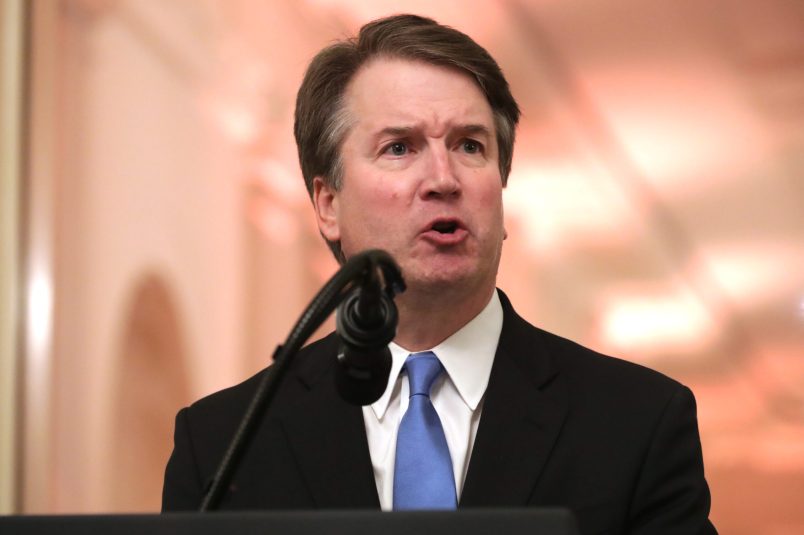Justice Brett Kavanaugh boldly struck pen to paper in an opinion published Monday, filled with a righteous anger — not so much over Alabama’s congressional maps, which a lower court found to disenfranchise Black voters, but because Justice Elena Kagan criticized him and his conservative buddies in her dissent.
The conservative majority that halted the lower court ruling requiring Alabama to redraw its congressional maps did not lay out its reasoning, but Kavanaugh wrote a concurring opinion on his own. Kagan and Chief Justice John Roberts, the latter joining the liberals, wrote separately in dissent.
Kagan, her prose infused with horrified anger, pointed out that the state of Alabama, in its arguments defending a map that lumped Black voters into a single district, seeks to “graft onto” the Voting Rights Act “a new requirement, lacking any foundation in our precedent.” The state is claiming that if a new map to craft two Black majority districts is to be drawn, it must be drawn without taking race into account as a priority — otherwise, the state claims, it would be an illegal racial gerrymander. The argument, if the conservative majority accepts it, would make vote dilution lawsuits under the Voting Rights Act all but impossible to win.
The lower court pointed out that reality, and duly required the state to produce new maps.
Kavanaugh, though, is offended by that truth, even after voting with his rightwing cohort to let the gerrymandered maps stand for now.
“The stay order does not make or signal any change to voting rights law,” he insists. “The stay order is not a ruling on the merits, but instead simply stays the District Court’s injunction pending a ruling on the merits.”
It also leaves a map found to have suppressed the vote of Black people in place until the Court feels like issuing a real decision. The first day of absentee primary voting in Alabama is at the end of March. Its primary is in late May.
Kavanaugh later takes umbrage at Kagan’s accusation that her colleagues, by letting these maps stand, are threatening years of precedent via shadow docket without even giving the people they affect an explanation.
“The principal dissent’s catchy but worn-out rhetoric about the ‘shadow docket’ is similarly off target,” he huffs.
But he devotes the most time in his concurring opinion to the absolute hell that the lower-court ruling requiring a new map would rain down on Alabama — no matter that the legislature was able to produce the previous maps in less than a week. No matter that the only delay in the case so far came at Alabama’s request. No matter that the legislature has access to a cartographer and maps that would fulfill the lower court’s order.
Kavanaugh’s staunch concern, he insists, is with the voters.
“Late judicial tinkering with election laws can lead to disruption and to unanticipated and unfair consequences for candidates, political parties, and voters, among others,” Kavanaugh writes. “It is one thing for a State on its own to toy with its election laws close to a State’s elections. But it is quite another thing for a federal court to swoop in and re-do a State’s election laws in the period close to an election.”
“Close to the election,” as Republicans from Kavanaugh to Senate Majority Leader Mitch McConnell (R-KY) know well, is a fluctuating measurement. But leaving the Black voters in Alabama in limbo about their access to this country’s fundamental freedom in the upcoming elections is Kavanaugh’s God-given right.
“Contrary to the dissent’s mistaken rhetoric, I take no position at this time on the ultimate merits of the parties’ underlying legal dispute,” he writes. “And I need not do so until the Court receives full briefing, holds oral argument, and engages in our usual extensive internal deliberations.”
So there.



